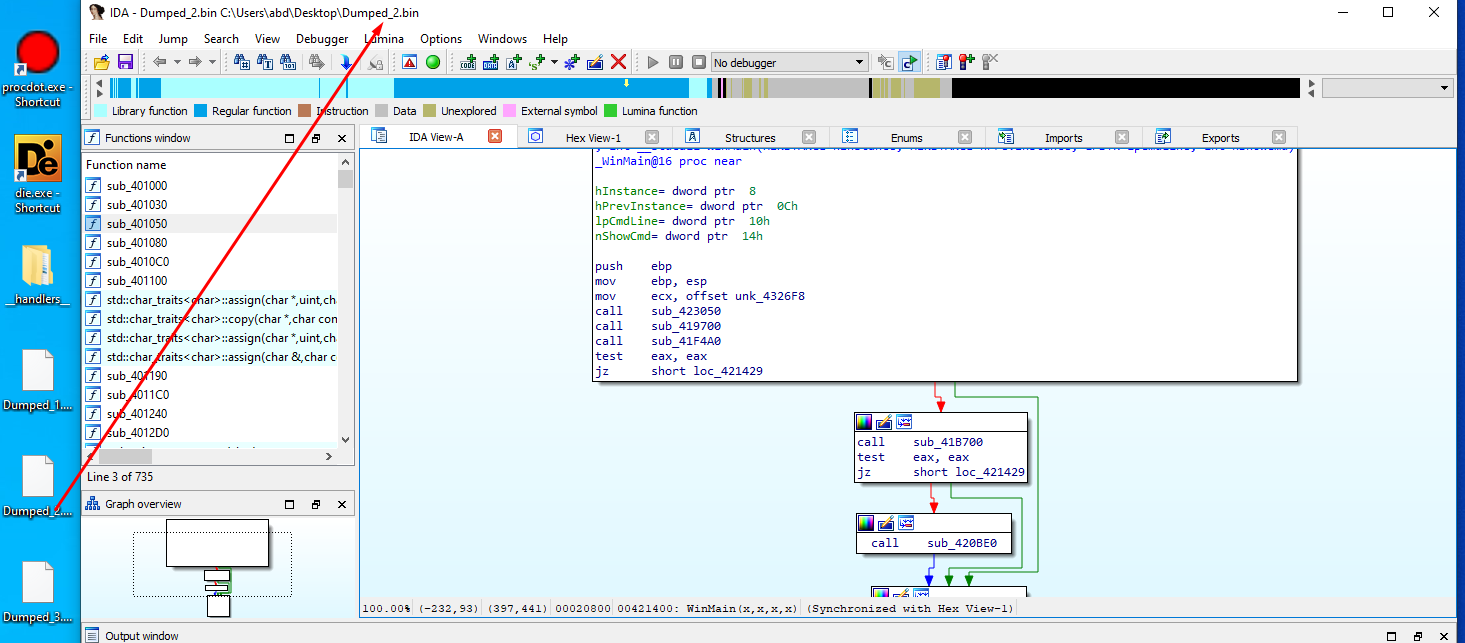Automated malware analysis with frida
Frida is Dynamic instrumentation toolkit for developers, reverse-engineers, and security researchers. Dynamic instrumentation is the process of modifying the instructions of a binary program while it executes.
It is possible to inject your own scripts into application processes and hook any function, spy on crypto APIs or trace private application code. This also allows modifying your injecting script and seeing the results instantly. With the help of Frida, we can bypass certificate pinning, root detection, dump memory…etc.
First Part
install it with:
pip install frida-tools
Runs with:
frida-trace -f <program name> -i <Function(s) to monitor>
We can use for example to see what a malware will code inject into. Using my analysis of Andromeda as an example.
One important api call in code injection is createprocess or openprocess to get a handle to the process it will inject to We hook that api with following command:
frida-trace -f andromeda -i KERNEL32.DLL!CreateProcessW
We get one hit

_handlers folder.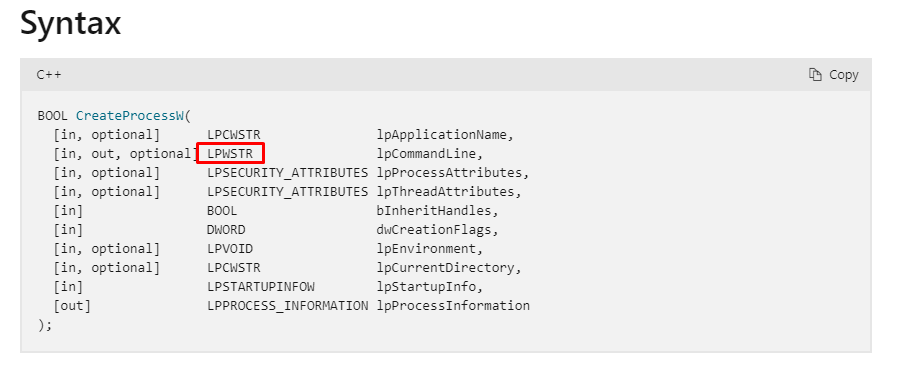
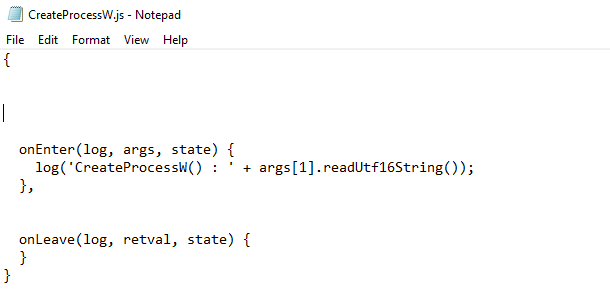
And we get the hooked process

We can use it same way with LoadLibraryA


According to our analysis we know that 4010E6 is the function that resolves the api calls from a dll and returns address of the function

we will need a custom script to input our 4010E6 function and get the name of the function from the address returned, so we will use `frida` command this time not `frida-trace`:
frida -l resolver.js -f andromeda
with this custom script:
Interceptor.attach(ptr('0x4010E6'), {
onEnter: function(args) {
},
onLeave: function(retval) {
var resolvedFunction = DebugSymbol.fromAddress(retval).name;
console.log('Return value:', resolvedFunction);
}
});
And we get the resolved APIs (same way can be used for config extraction for other malwares)
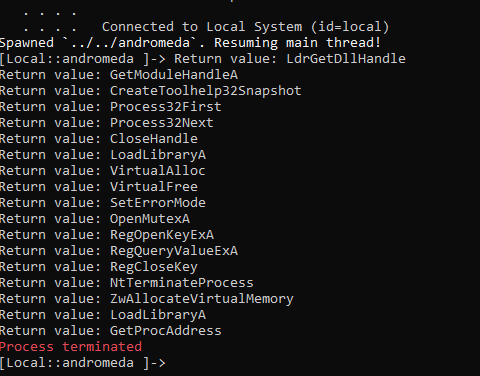
Second Part
VirtualAlloc to allocate space for the main payload, and we will use VirtualAlloc as a checkpoint as it is used a lot to check if our main payload is written into the allocated space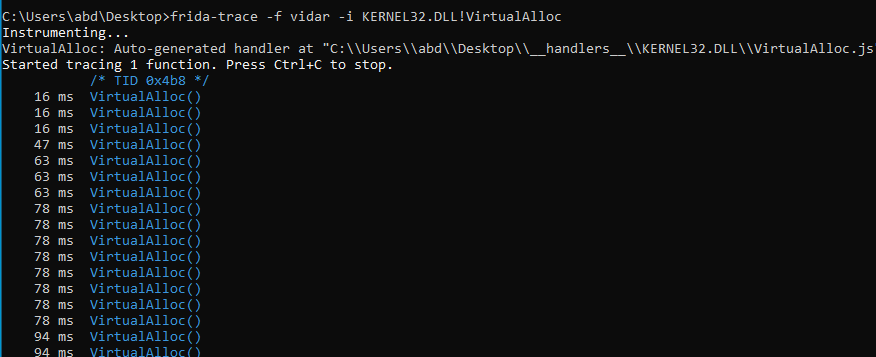
Then using the below python script which gets address of allocate address at onLeave and at the next VirtualAlloc call onEnter i check if there an executable written and dump it
import frida
import sys
import time
import argparse
parser = argparse.ArgumentParser(description='Unpacker via frida')
parser.add_argument("-f","--file",required=True)
args = parser.parse_args()
pid = frida.spawn(args.file)
session = frida.attach(pid)
time.sleep(1)
script = session.create_script("""
var vaExportAddress = Module.findExportByName("kernel32.dll", "VirtualAlloc");
var count = 0;
var vaRet = 0;
var vaSize = 0;
if (vaExportAddress != null) {
console.log("VirtualAlloc found at: " + vaExportAddress);
Interceptor.attach(vaExportAddress, {
onEnter: function (args) {
if (vaRet != 0 ){
if (vaRet.readAnsiString(2) === "MZ") {
console.log("Found PE header at allocated memory");
count += 1;
var mainP = vaRet.readByteArray(vaSize);
var fileName = "Dumped_" + count + ".bin";
var file = new File(fileName, "wb");
file.write(mainP);
file.flush();
file.close();
console.log("Dumped -> " + fileName);
}
}
vaSize = args[1].toInt32();
console.log("VirtualAlloc called with size: " + vaSize);
},
onLeave: function (retval) {
if (retval.isNull()) {
console.log("VirtualAlloc returned NULL");
} else {
vaRet = ptr(retval);
}
}
});
} else {
console.error("VirtualAlloc not found in kernel32.dll");
}
""")
script.load()
frida.resume(pid)
sys.stdin.read()
It dumped three files
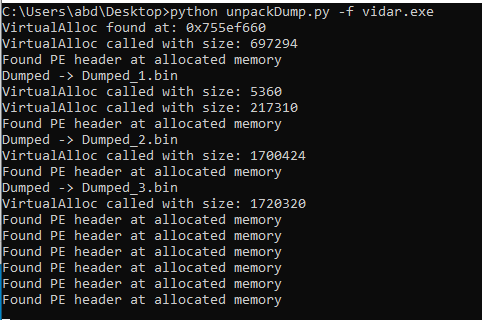
Where our unpacked binary is second file dumped and the others is just windows dlls
